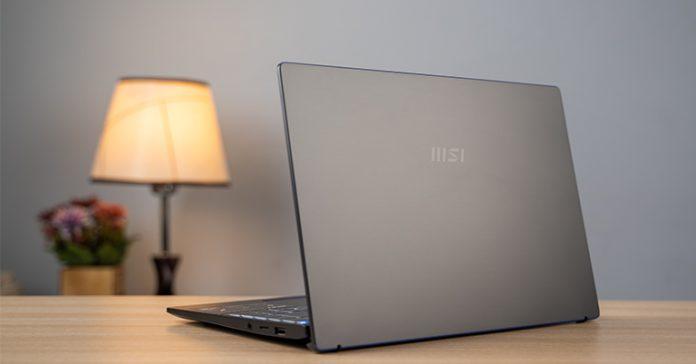
MSI is almost a household name in the world of gaming PC. Yet, the company has found little success in the non-gaming domain despite its best attempt. I don’t mean to spoil the forthcoming review but the MSI Prestige 14 Evo that I have with me right here is a pretty decent thin-and-light machine with a few imperfections.
MSI Prestige 14 Evo (A11M) Specifications:
Design
&
Build:
Color Options:
Display:
Resolution:
Keyboard:
Trackpad:
Processor:
RAM:
Storage:
Graphics:
Audio:
Battery:
Power Supply:
Webcam:
Connectivity:
I/O Ports:
Price
in Nepal:
What’s inside the box:
MSI Prestige 14 Evo (A11M) Review:
Design
I’m particularly fond of how portable it is. Weighing just 1.29 kg with a thickness of 0.62-inches, I could simply pop it into my backpack and almost forget that it’s there in the first place. Considering how this is one of the biggest selling points of this machine, I’d say MSI has nailed the portability aspect. The Prestige 14 Evo comes in an all-metal build just like its predecessor. Plus, it’s available in two subtle color options that seamlessly adapt to a professional setting.
But unlike the Prestige 14 Evo of last year (A10M), the company has treated this year’s iteration with the new logo on the lid. Contrary to the classic “MSI Dragon” branding, this one’s more subtle and suitable for the target demographics.
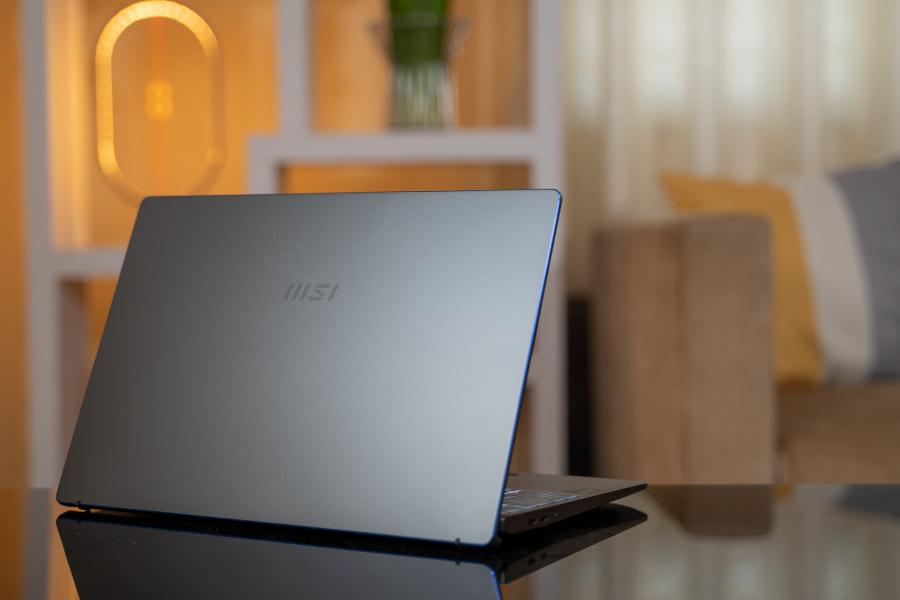
With the sandblasted finish, it doesn’t attract nearly as many smudges either. Yet, the keyboard chassis, more specifically the palm rest area is a different story which I’ll get into in just a bit. Anyway, this laptop is available in either Pure White or Carbon Gray color options. While the former is more tempting and would’ve been my first choice, I’ve grown to like the Carbon Gray variant over time.
Thanks to its subdued blue accent throughout the edges, the MSI Prestige 14 Evo adds a bit of flair to an otherwise boring slab. There’s also a Rose Pink option but its availability is limited to select markets only. Now, it’s not a convertible laptop but you can push the hinge to a flat 180-degree. While you’d think there would be little to zero practical reasons to do so (and you’d be right for the most part), MSI has spiced things a bit with its “Flip-n-Share” feature. Just hit the F12 button to share your screen’s content with the person sitting next to you.
You’re also getting a “special hinge” (as MSI calls it) with the Prestige 14 Evo. It raises the device by 5 degrees for a more comfortable typing experience and a more efficient cooling solution—something that this laptop desperately needs. Talking about cooling, it expectedly has a single fan solution with patterned intake vents on the bottom, with the exhaust hidden in the hinge itself.
Unlike the couple of 2-in-1s that we’d recently reviewed, MSI hasn’t added a faux exhaust on the opposite side for a more symmetrical look. But honestly, I don’t care for it. However, what I am thankful for in this machine is its military-grade durability. Passing the MIL-STD-810G certification, the MSI Prestige 14 Evo is designed to survive accidental bumps and such. This has already proven its worth during my time with the device. My niece accidentally dropped that laptop from about half a meter’s height and luckily, it suffered no harm.
The port selection on this thing is pretty decent as well. You get two USB Type-C connections on the left, both of which support DisplayPort, Thunderbolt 4, and PD charging. You’ll find a solitary USB 2.0 Type-A port on the right alongside a micro SD card reader and a 3.5mm mic/headphone jack combo.
I will say MSI could’ve gone with the newer USB 3.2 standard on the Type-A port though. To sum it all up, the Prestige 14 Evo wins the top mark in terms of its design.
Display
Jumping to the display side of things, it’s a standard 14” FHD IPS panel that doesn’t support touch input. MSI says it covers around 100% of sRGB or 72% of NTSC color space and from what I can tell, its color reproduction is pretty decent. Contents look sharp and vibrant enough to not distract you from the task at hand.
Yet, professional graphics designers would want something more. The company also mentions that the Prestige 14 Evo equips a “low power” panel but fails to give any specifics. Traditional laptops use a 2.5W display while the industry standard for a power-efficient panel would be a 1W screen.
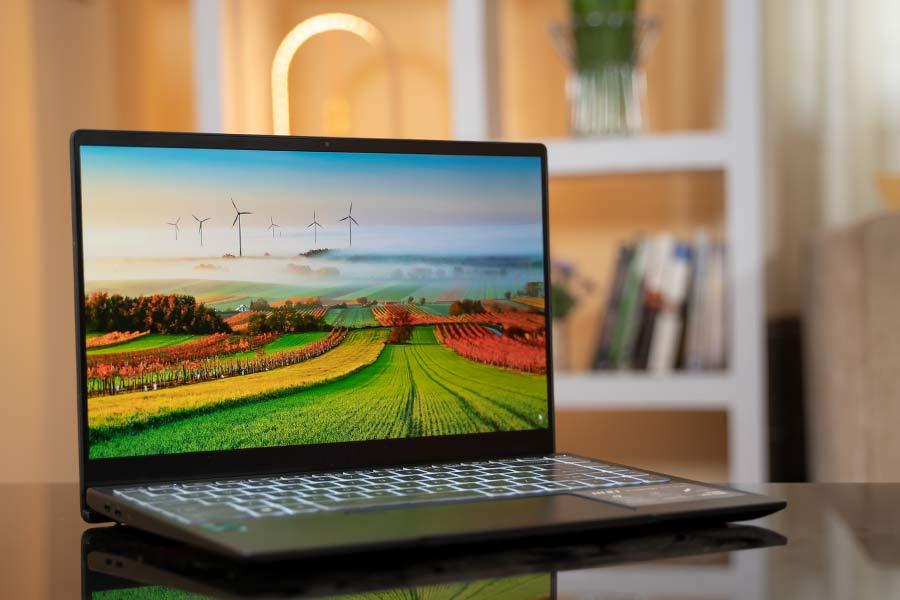
While I’d like to believe that this machine features the latter, without any official info to back that claim, I can’t talk about it with absolute certainty. Regardless, this 300 nits panel doesn’t get very bright either. In a daylight setting with plenty of ambient light, you will struggle to see the screen content even at max brightness.
Plus, MSI only sells one variant of this laptop in terms of its display so for those whose use case mostly revolves in an outdoor environment, I don’t even get to recommend a higher brightness option of the Prestige 14 Evo. Having said that, if you don’t belong to the aforementioned user group, this screen’s illumination is more than sufficient.
Apart from this, I have no complaints regarding the viewing angles here. I couldn’t notice any screen bleeding either. Moreover, it also inherits an anti-glare coating so using it in rooms with multiple light sources has been no problem. Still and all, seeing this as a business and productivity-grade machine, I wish MSI had opted for a wider 16:10 aspect ratio instead of sticking to the plain old 16:9 standard.
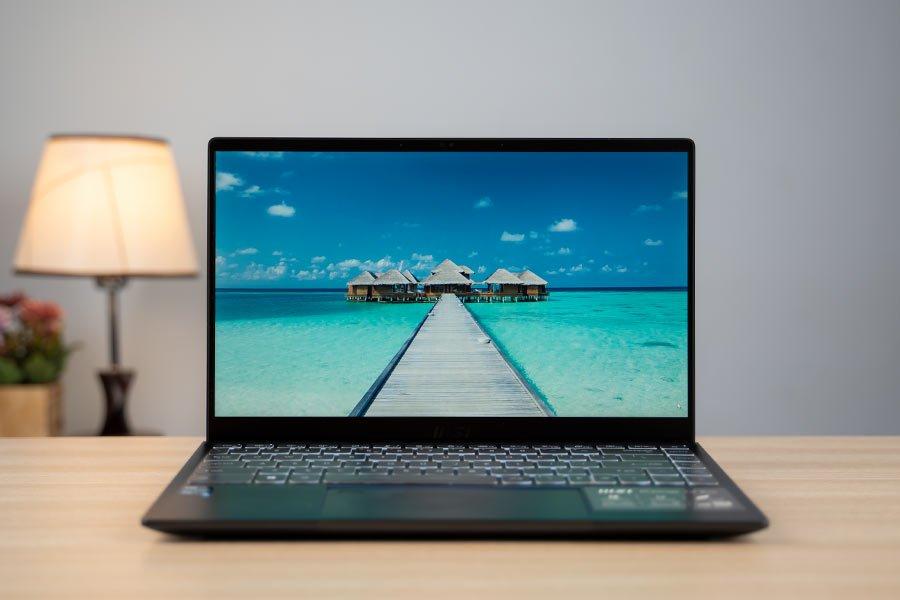
After all, there’s more than enough room to make that possible. Simply cut down the bottom bezel and trim down the one on the top. Boom! The side bezels are fairly slim for a 2021 laptop though. With this, the company claims that the Prestige 14 Evo achieves a nearly 90% screen-to-body ratio. Additionally, the screen does flex a bit but I wouldn’t worry about it.
Keyboard
Moving on, I’ve enjoyed typing on this laptop so far. Its chiclet-style keys are well spaced out and are almost impervious to any degree of rattles. 1.5mm key travel still remains my personal favorite and the Prestige 14 Evo’s keyboard embodies the same travel distance. As a result, I’ve had very few mistypes throughout the review period on the MSI Prestige 14 Evo.
On top of this, its 5-degree hinge has also amplified the typing experience. But if you’re someone who favors a flat layout instead, you’d want to skip this. Still, the angle of elevation isn’t that high to result in any fatigue or discomfort to the wrists. Besides, the keys are quiet too—some of the quietest ones I’ve used lately.
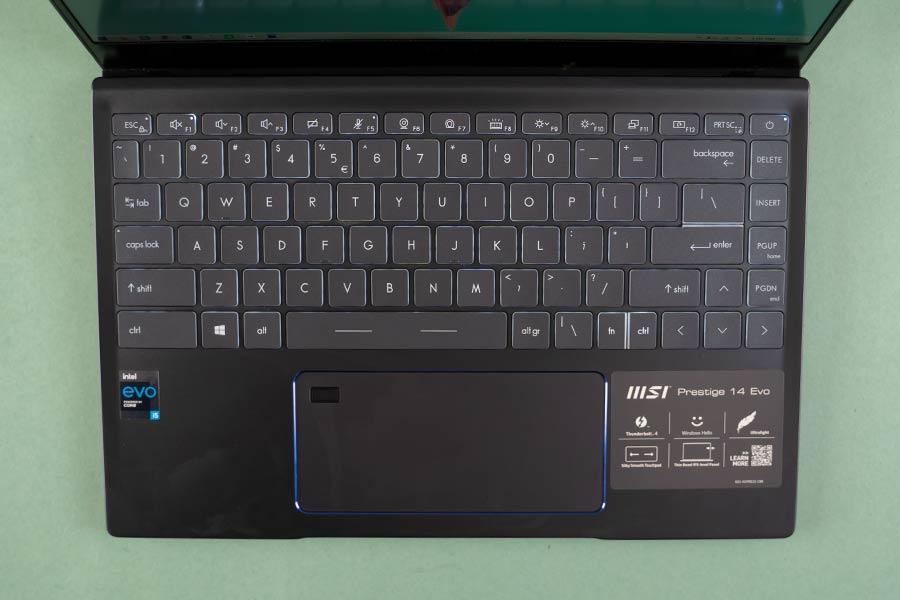
It does feel a little soft although I don’t have a problem with that. Yet, I did notice slight flex in the keyboard chassis but only with significant pressure, so nothing to worry about.
As expected, these are backlit as well and you can choose from 3 levels of illumination. I like how turning it on accentuates the silver-gray underlining in the keys. Looks pretty unique. You can also lock the function key and there are helpful LED indicators on volume and microphone usage. I would’ve liked one on the webcam as well, but it is what it is. All in all, I’m quite happy with Prestige 14 Evo’s keyboards. If I really had to nitpick, the one thing I would’ve done differently is separate the Function and the right control key.
Trackpad
Another one of Prestige 14’s fortes is this ultra-wide trackpad. On top of its sheer size, this track is silky smooth to touch. Makes me want to scroll away and do nothing else. Anyway, this glass trackpad has integrated left/right keys.
While they click well enough, I just wished the key distance was a little shorter. It also gets pretty loud and the key travel distance makes it feel almost plasticky. Other than this, this trackpad handles multi-finger gestures including pinch-to-zoom perfectly. Despite its wide layout, I rarely encountered an instance of accidental touches and MSI deserves a pat on the back for this.
But what I don’t appreciate is the fingerprint reader integrated into the trackpad itself. On top of creating an effective dead zone, its placement is pretty awkward too. We’d complained about this on our review of the Summit E15 as well. Also, this Windows Hello-certified biometrics option sometimes fails to recognize your finger if it’s even slightly sweaty/wet.
Webcam
For your video calling needs, MSI has installed a 720p IR webcam on the top. There is no dedicated privacy shutter here which is a little disappointing. Oh, and this one’s Windows Hello-certified too so you have a couple of secure authentication options here. Regardless, its quality is strictly average but passable for a laptop. The footage comes off grainy and the subject looks a little soft too. In addition, its audio pickup isn’t anything exceptional either.
Audio
Likewise, Prestige 14 Evo’s audio quality won’t blow you away either. It has a bottom-firing stereo speaker setup whose left/right separation isn’t half bad, to be honest. Even though it doesn’t get quite as loud as you’d want, I feel it to be adequate for an average-sized room. Thanks to the elevated hinge, the audio output gets a healthy room to breathe.
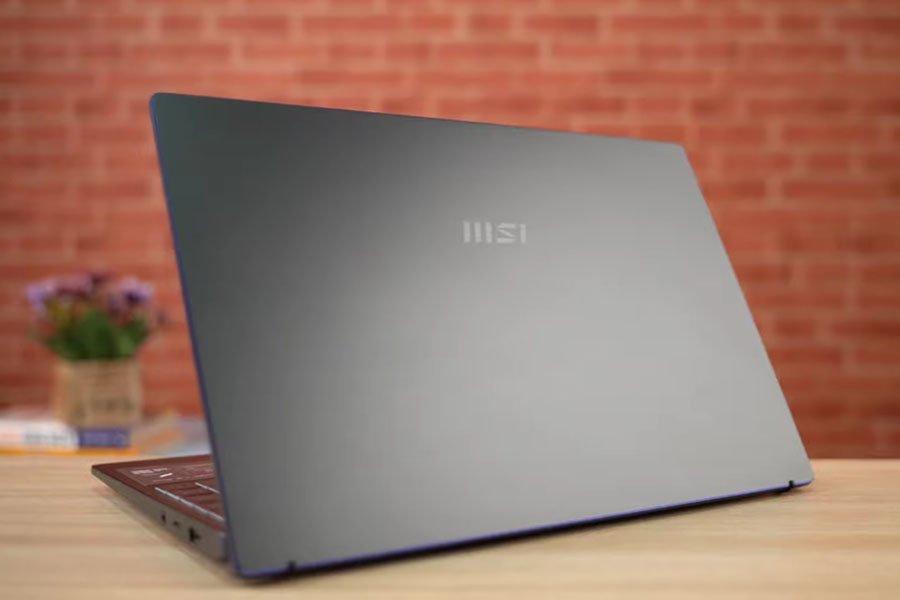
Listening to it at full volume, the sound quality is pretty admirable. There is hardly any distortion to be heard and with a keen pair of ears, you’ll be able to enjoy some detail in the audio as well. Nonetheless, don’t expect an immersive listening experience on this laptop though. While it is more than sufficient for general content consumption, you will want to pair it with a decent Bluetooth speaker for an elevated level of audio output.
Performance
Okay, let’s finally get into the performance side of things. Powering the MSI Prestige 14 Evo is the latest Intel Tiger Lake-U processor. Our review unit houses the Core i5-1135G7 CPU inside which has been paired with 16GB of DDR4 RAM and 512GB M.2 NVME PCIe Gen4 SSD. This variant goes for around $1,100 in the US but it’s a bit expensive here in Nepal, retailing at NPR 173,000.
In terms of upgrades, there’s not much you could do here since the RAM is soldered onto the motherboard. Thankfully, if you don’t find 16 gigs enough for your use case, there is a 32GB option as well. Additionally, for those who want more power, this laptop also comes with an Intel Core i7-1185G7 CPU. Unfortunately, MSI doesn’t ship either configuration with a dedicated GPU this iteration.
Considering how last year’s Prestige 14 was available with NVIDIA’s GTX 1650 as well, the company’s decision to skip it completely seems unsettling and rightfully questionable. By now, we know how impressive Intel’s Iris Xe integrated graphics is. Still, it’s no match for team green’s GTX series of GPUs.
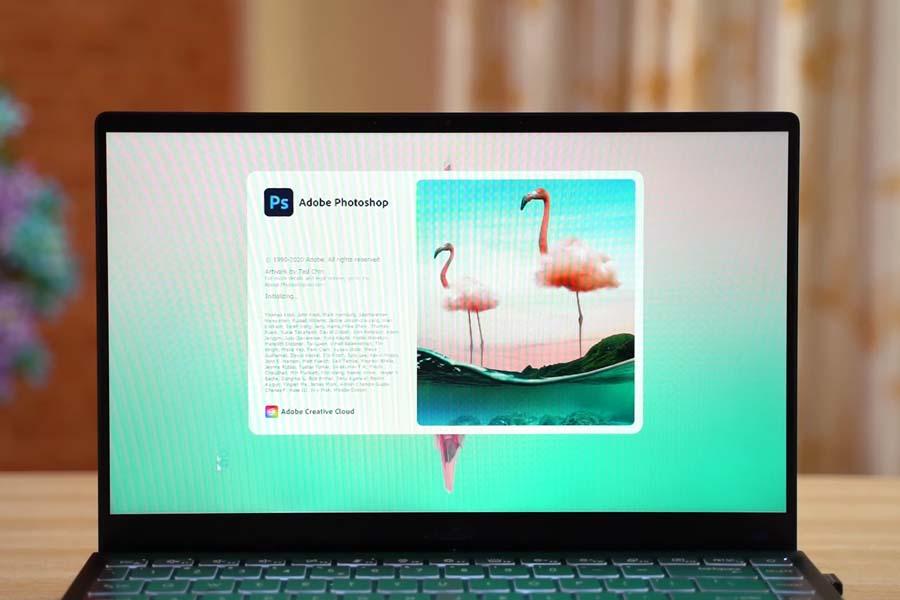
With a spacious 16GB of RAM at play on the MSI Prestige 14 Evo, I didn’t encounter a single instance of memory management issue during this review. The device can keep things intact even after switching back to an app after leaving it idle for a while. Weirdly enough, I did notice a couple of instances when the laptop refused to wake up after automatically going to sleep. Therefore, I’ve had to force restart the device to get into it. Not sure if it’s device-specific or whether Microsoft is to blame here.
Moving on, I’m pretty impressed with its PCIe Gen4 SSD too. Apps install and open up quickly here. Just look at the CrystalDiskMark score. Nice! I clocked my routine applications like Adobe Photoshop CC 2021 and LibreOffice Writer to open at an average of 8.4 and 1.7 seconds, respectively. Let’s look at a few more benchmark scores:
(FPS: 25.3, Score: 637, Min FPS: 6.7, Max FPS: 59.8)
You might already know by now that my main usage doesn’t consist of any demanding tasks. Simply browsing the web, using word processing apps, and light photo editing should be a piece of cake for this machine, right? RIGHT? Alas, the MSI Prestige 14 Evo struggles at meeting such a basic computing requirement.
That’s not to say that it frequently stutters or anything. Instead, this Ultrabook has a terrible thermal solution. It heats up quite easily and quite fast. For something that should stay covert in an office setting, the Prestige 14 Evo’s compromised cooling system forces you to turn on the loud fan every now and then.
There are multiple user modes to choose from under the “MSI Center for Business & Productivity” and I opted for the Balanced option. Additionally, you can also choose between the High Performance, Silent, and Super Battery modes which are pretty self-explanatory. Surprisingly, even the Silent mode doesn’t get adequately quiet.
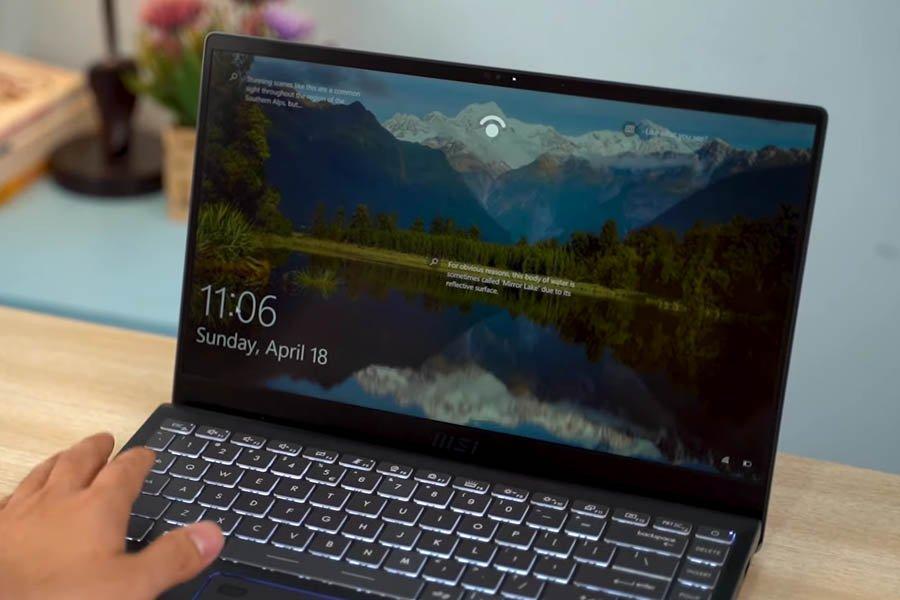
Because of the aforementioned heating issue, keeping my hands on the keyboard chassis would be a challenging experience. Even with the fan working its best, the laptop doesn’t cool down as quickly or as much. Remember when I said how the concern regarding smudges on the palm rest area is a different story? Yeah, the moisture from my palm would ultimately stick to the keyboard chassis, thereby resulting in visible smudges.
The MSI Center also has an application optimizer option that supposedly tunes system resources accordingly. But I couldn’t notice any difference in actual performance level when turning it on/off.
If you don’t mind the heat (which I don’t think anyone could), you can even enjoy a couple of games or two on the MSI Prestige 14 Evo. Playing Valorant with Low graphics quality and V-Sync, anti-aliasing turned off, I managed to get an average of 78-80 fps.
There were a couple of instances of stutters but that’s totally negligible. On the other hand, CS: GO gives a playable 79-83 fps at Low graphics with MSAA and FXAA turned off. But let me reiterate, this is by no means a gaming machine and I wouldn’t suggest you turn up the heat, literally.
Battery
When it comes to battery life, I’ve got bad news here as well. Now, this is really shocking considering its “Intel Evo” certification. If you didn’t know, this Intel standard (previously Project Athena) promises faster performance, simplified connectivity, etc. And one of such promises is 9+ hours of battery life on FHD displays. However, not once did the Prestige 14 Evo didn’t deliver this on my usage.
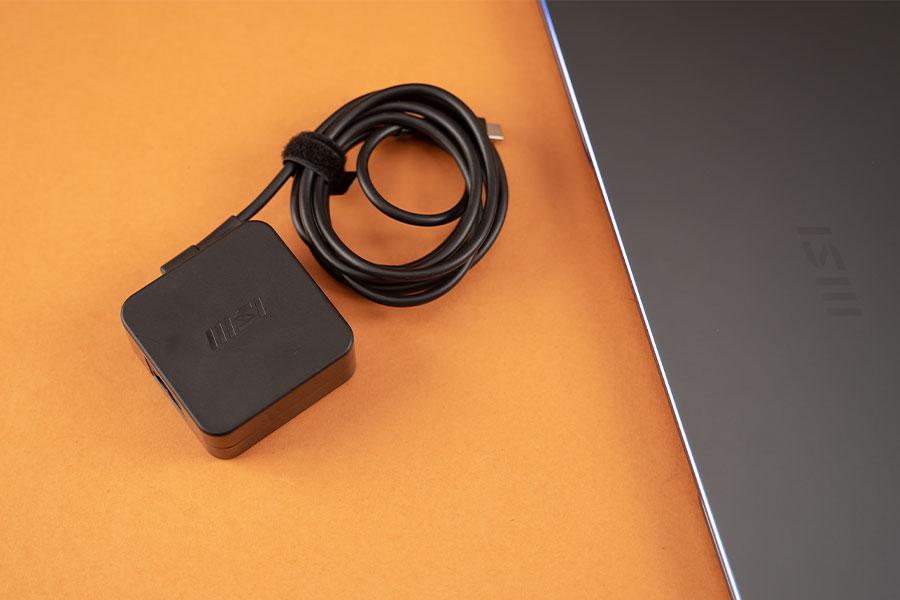
This laptop comes with a 52 Watt-hour battery which sounds fairly large for a 14” laptop. But the best I could squeeze out of this machine was around 6 hours of battery life, with the most disappointing number clocking at just 4 hours.
Like I mentioned earlier, my usage consisted of editing documents on LibreOffice Writer with light editing on Adobe Photoshop and 7-8 Chrome tabs open in the background. Moreover, I kept my brightness at 43-45%. So, seeing let down on the battery front has been a real disappointment.
Charging up the battery is pretty quick though. Using the 65W AC adapter, the laptop climbs to 75% in an hour while getting to 100% takes about 50 minutes more. To enhance battery health, there’s also an option to stop the charge at 50 or 70% under the MSI Center.
Conclusion
Wrapping up this review, the excellent portability of MSI Prestige 14 Evo is ultimately haunted by its lackluster thermal performance and the compromised battery life. For a laptop that costs over a thousand dollars, these shortcomings are just too big to label it as a viable machine for anyone. But hey, if you just want a lightweight machine and your use-case doesn’t include anything mildly demanding, and if MSI were to push an update fixing the heating issue, I could see the Prestige 14 Evo being a decent choice.
MSI Prestige 14 Evo Review: Pros & Cons
Pros:
Cons:
